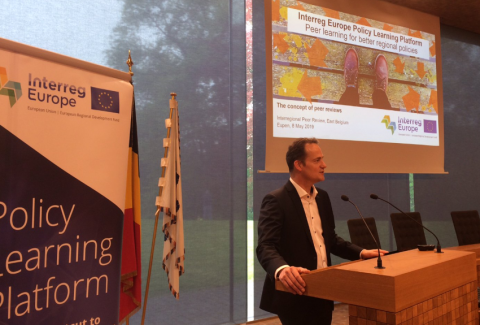Meeting EU peers helps Belgian policymakers to improve their SECAP
On 8-9 May 2019, a peer review was organised in Eupen for Belgium's German speaking community to receive hands-on feedback and advice on the coordination and implementation of their brand new joint Sustainable Energy and Climate Action Plan (SECAP).
The summary report is available here.
The German speaking community is located in the East of Belgium, next to the borders of the Netherlands, Germany and Luxembourg. Slightly over 77,000 inhabitants live in nine municipalities of the community.
Along with a political agreement reached between the Walloon region and the German-speaking community in 2018 about the transfer of certain energy-related policy competences in the community, the municipalities have joined the Covenant of Mayors as a group and elaborated a joint Sustainable Energy and Climate Action Plan (SECAP) under the coordination of the Ministry of the German speaking community who became Covenant Coordinator.
The joint SECAP was approved by the municipality councils at the end of April 2019. The plan focuses on mobility/transport, housing, public authorities and renewable energy as well as climate adaptation.
The challenge of the German speaking community
With the peer review, the German speaking community wanted to focus on practical approaches and challenges in coordinating and implementing a multi-municipality SECAP and in supporting the local authorities regarding energy-related measures. The community aims to improve its management strategy with regard to measure implementation, reporting and overall coordination together with local stakeholders, to reach its ambitious climate goals for 2030.
The Minister President of the Community, Mr Paasch summarised the key question of the peer review in his opening: “What can we learn from our neighbours and other European regions in governing and implementing our SECAP so that our tiny border region achieves its CO2 reductions in a timely and effective manner?”.

Peers from across Europe
Alongside Astrid Severin and Katharina Krell, our low-carbon economy experts, brilliant peers were invited and participared to the peer review:
- Andrea Carosi, Project Manager at SVIM - Sviluppo Marche S.r.l., Ancona (Italy)
- Bernd Lämmlin, Koordinator des Regionalbüros Süd, Stv. Abteilungsleiter, Energieagentur Rheinland, Palatinate (Germany)
- Johanna Punkari, Project Manager at South Ostrobothnia Energy, Lapua (Finland)
- Nathalie Garré, Environmental Expert, Department Environment, nature, climate and energy at West-Vlaamse Intercommunale, Bruges (Belgium)
Practical exchange on implementing SECAPs
In the following two days, stakeholders from East-Belgium and four peers from West Vlaanders (BE), Marche Region (IT), South Ostrobothnia (FI) and Rhineland-Palatinate (DE) exchanged knowledge and tools under the moderation of the low-carbon economy expert Katharina Krell from the Policy Learning Platform.
Moreover, stakeholders from the region had the opportunity to voice their needs and provide feedback. The peers then provided the German speaking community with specific, tailor-made recommendations on governance structures, support tools for the municipalities, data collection, monitoring and reporting, as well as funding schemes.
'This has been a very good, very practical exchange and I had the feeling that I have made a real contribution with my experience. It was also good to see that everybody struggles in the smaller cities with 5000-10,000 inhabitants' says Nathalie Garré from the West-Vlaamse Intercommunale.
Dr. Bernd Lämmlin, from the Energy Agency Rhineland-Palatinate, added 'This has been my first Policy Learning Platform Peer Review. I particularly appreciated the structured approach to provide feedback on specific subjects. East Belgium has a similar structure as Rhineland-Palatinate and the exchange has thus been very inspiring for me as well.'
‘I have learnt a lot of things about funding schemes and tools used in other regions. And I have seen that other peers are facing the same issues for example in the area of mobility. When I am back in Finland, I will share with the 100 employees in my region what I have learnt during the Peer Review in East Belgium’ says Johanna Punkari, Project Manager, South Ostrobothnia Energy Agency Thermopolis.
While the German-speaking Community has drawn up a summary report for the implementation of the recommendations, the municipalities and stakeholders from East Belgium and the peers agreed to stay in touch for future collaboration and to exchange useful strategy papers and monitoring tools.
Are you a Managing Authority and interested in a peer review? Check the details and apply any time - the call is open permanently.
